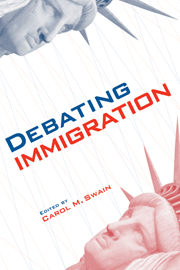Book contents
- Frontmatter
- Contents
- About the Contributors
- Preface
- Acknowledgments
- 1 Introduction
- PART I PHILOSOPHY AND RELIGION
- PART II LAW AND POLICY
- 6 The Undocumented Immigrant
- 7 Good Neighbors and Good Citizens
- 8 Alien Rights, Citizen Rights, and the Politics of Restriction
- PART III ECONOMICS AND DEMOGRAPHICS
- PART IV RACE
- PART V COSMOPOLITANISM
- PART VI CONCLUSION
- Notes
- Index
8 - Alien Rights, Citizen Rights, and the Politics of Restriction
Published online by Cambridge University Press: 05 June 2012
- Frontmatter
- Contents
- About the Contributors
- Preface
- Acknowledgments
- 1 Introduction
- PART I PHILOSOPHY AND RELIGION
- PART II LAW AND POLICY
- 6 The Undocumented Immigrant
- 7 Good Neighbors and Good Citizens
- 8 Alien Rights, Citizen Rights, and the Politics of Restriction
- PART III ECONOMICS AND DEMOGRAPHICS
- PART IV RACE
- PART V COSMOPOLITANISM
- PART VI CONCLUSION
- Notes
- Index
Summary
THE HARSH VIEW OF AMERICAN IMMIGRATION POLITICS
Scholars of American immigration policies have long understood that they characteristically emerge from a “strange bedfellow” politics comprising opposing political coalitions that, in Daniel Tichenor's words, “cut across familiar partisan and ideological lines.” Many employers and free market economic conservatives support expansive opportunities for immigration, often in alliance with pro-immigrant cosmopolitan liberals and ethnic American advocacy groups. Cultural conservatives generally favor restrictive immigration policies, and historically they have often been joined by many unions and others on the Left who have wished to protect American workers from competition with cheap immigrant labor. The latter groups – cultural conservatives, American workers, and those who identify with them – have usually greatly outnumbered the former groups among the general public, so opinion polls traditionally show majority support for more restrictive immigration policies.
But the United States has often had relatively generous immigration policies nonetheless, accompanied by large numbers of undocumented aliens. I am among the somewhat cynical who have explained this apparent anomaly by arguing that the proponents of more open immigration, especially employers but also in the last quarter-century ethnic advocacy groups, have generally been more intensely active on the issue and more politically powerful than their opponents. Thus they have been able to get their way in substance. The fact that American majorities have favored restrictive immigration, though more diffusely and less intensely, has meant only that policymakers in the United States have set some partly symbolic limits on immigration that could gratify cultural conservatives without much helping American workers.
- Type
- Chapter
- Information
- Debating Immigration , pp. 114 - 126Publisher: Cambridge University PressPrint publication year: 2007
- 2
- Cited by

